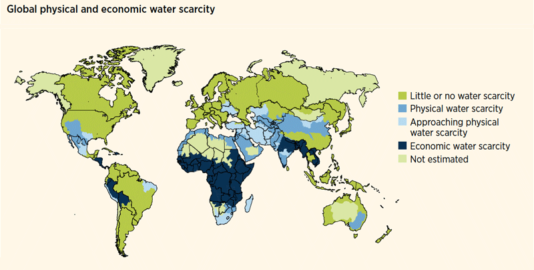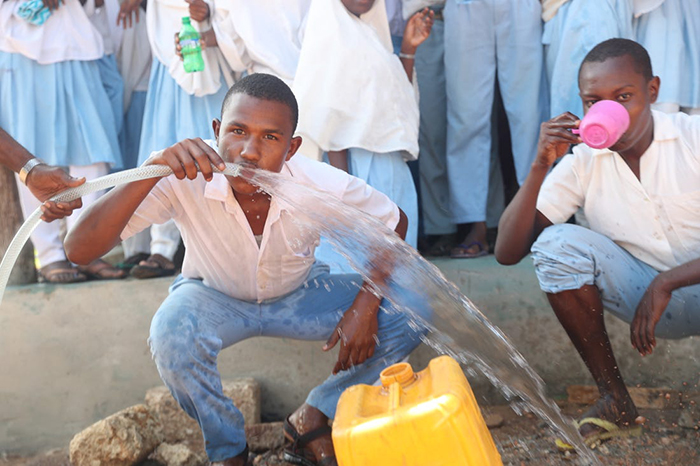- About
- Topics
- Story
- In-Depth
- Picks
- Opinion
- News
- Donate
- Signup for our newsletterOur Editors' Best Picks.Send
Read, Debate: Engage.
| May 14, 2015 | |
|---|---|
| topic: | Health and Sanitation |
| tags: | #Clean Water Solutions, #Clearinghouse, #Kenya, #River Nile |
| located: | Kenya |
| by: | Bob Koigi |
Rural families in Kenya have few or no sources of clean water, with studies by Water Link International showing that half of the population in Kenya, and a majority in the rural areas, use contaminated water for drinking and cooking.
Unlike their urban counterparts, the rural people do not have access to piped water, which is treated at water plants. In the Nyeri area of Central Kenya, one of Kenya’s largest rivers, River Chania, runs through the area with a majority of the rural residents relying on it for consumption. The water is contaminated as a result of the dumping of chemicals, washing away of fertilizer-laden soils through soil erosions, fecal matter from animals grazing near the river source and open defecation.
But the menace of unsafe drinking is not confined to Central Kenya alone. Just recently an outbreak kilometers away in Western Kenya suspected to be as a result of drinking untreated water, claimed seven lives with 80 people hospitalized in critical condition.
It is a regrettable cycle that has gone unchecked for years and in its wake claimed incomes and livelihoods. Yet it doesn’t have to be this way. For every dollar spent on clean water systems in Africa, about $8 in health care costs are avoided according to Dr. Barry Otoyo from Kenyatta National Hospital, Kenya’s largest hospital. “It is regrettable that mothers and children in the 21st century have to succumb to such avoidable diseases. There definitely has to be a mind shift,” he said.
But it is easier said than done. Rural households with pressing needs do not see the need for water treating techniques which they deem expensive. The cheapest is around $0.50, liquid chlorine packaged in miniature bottles which experts have advocated for as the quickest and most convenient water treatment solution, especially for those living in rural areas.
But that hasn’t caught the attention of the bulk of the populace. To those who make an attempt at treatment, traditional methods have proven expensive. For example water boiling consumes a large amount of fuel and with the felling of trees now being discouraged in the country, households are abandoning that too.
That is why the new treatment techniques being embraced by women, has spread like bush fire across Central Kenya and beyond. Its genesis is a visit by one woman, now the pioneer of the project, to South Sudan where the women have for long relied on the seeds to clean the muddy waters of River Nile for their drinking and cooking.
“I had gone on a church exchange programme. And when we took the tour around the River Nile I was amazed at the instant transformation of the water from the river, which even the women and children would drink. I knew back home this was a big problem. I sought to replicate it,” said Jenita Waciuru.
The purification process involves grinding Moringa seeds into a paste, mixing that paste with untreated water, waiting for the paste particles to bind with the impurities and settle to the bottom, and then decanting or siphoning the pure water off the top.
The purified water produces a 90-99 percent bacterial reduction and reduces 'turbidity', making water less cloudy.
The Moringa tree, sometimes referred to as the Indian miracle tree or Mother’s best friend, has long been known to offer amazing health benefits in its own right. Its leaves contain four times the Vitamin A of carrots, four times the calcium in milk, more iron than spinach, seven times as much vitamin C as oranges and three times the potassium in bananas, as well as more protein than either milk or eggs.
But its use as a water purifier amounts to a new bonus again from one of the world’s most extraordinary trees.
When you add the crushed seeds to the water, the seeds attract the dirt particles, which are floating in water including the disease causing organisms. The dirt attaches to the seeds and they fall together to the bottom of the jar. Then the water is ready to drink,” said Esther Wokabi one of the women actively involved in the project and who has trained over 200 households in the low cost water preservation since the project began in 2011.
Moringa tree is easily accessible in the rural areas which makes seed access for purification easy. Enterprising women are packaging the seeds in smaller quantities for sale. And the locals are buying them. Researchers have equally given the purification method a clean bill of health.
According to Michael Lea, a scientist at Clearinghouse, a Canadian organization that investigates low cost water purification technologies, crushing Moringa seeds in water can cut the time taken for bacteria and solids to settle from a full day to just one hour, and has the potential to prevent diarrhea. The researcher reports that the seeds can provide a low-cost, accessible purification method for poor communities where diarrhea caused by water-borne bacteria is the biggest killer of children aged five and under.
By copying the embed code below, you agree to adhere to our republishing guidelines.

